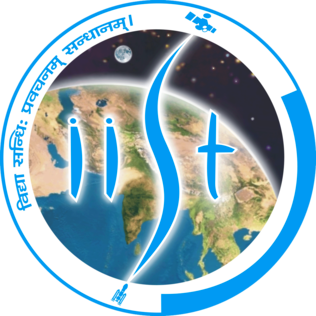Indian Institute of Space Science and Technology (IIST), situated at Thiruvananthapuram is a Deemed to be University under Section 3 of the UGC Act 1956. IIST functions as an autonomous body under the Department of Space, Government of India. The idea of such an institute was mooted keeping in mind the need for high quality manpower for the Indian Space Research Organization, one of world’s leading scientific organizations engaged in space research and space applications. The institute is the first of its kind in the country, to offer high quality education at the undergraduate, graduate, doctoral and post-doctoral levels on areas with special focus to space sciences, space technology and space applications. IIST was formally inaugurated on 14 September 2007 by Dr. G. Madhavan Nair, the then Chairman, ISRO and was temporarily housed in the premises of Vikram Sarabhai Space Centre, very close from where ISRO built and launched its first rocket. Both the founding fathers of the institute, Dr G Madhavan Nair and Dr B.N. Suresh, the latter being the first Director of IIST, played a very important role in the formation of the institute, facilitating its establishment and contributing to its vision. Dr B.N. Suresh piloted the institute from the conception of the idea to its realization in a permanent campus near Thiruvananthapuram in 2010.
IIST offers various undergraduate and postgraduate programmes in areas that are relevant to space studies. The institute currently offers two BTech courses in Aerospace Engineering and ECE Avionics and a Dual Degree (B. Tech + Master of Science/ M. Tech) programme with BTech in Engineering Physics and any of the following Postgraduate specializations – (i) Master of Science (Astronomy & Astrophysics) (ii) MTech (Earth System Science) (iii) Master of Science (Solid State Physics) and (iv) MTech (Optical Engineering). Admissions to these branches are merit based and intake is based on the Joint Entrance Examination (Advanced) conducted by IITs, as per the guidelines set by IIST. The major feature of the undergraduate program is the liberal offer of assistance ship to meritorious students, rendering the education “completely free”, subject to the students securing a stipulated minimum academic requirement. As performance based financial assistance is provided by DOS to the BTech students of IIST, ISRO/DOS will have the first right to absorb them, subject to the vacancies notified by ISRO in that particular discipline and year for IIST graduates.
Apart from this, IIST offers postgraduate programmes in fifteen areas of space science, space engineering and related areas. These MTech and Master of Science programmes are open to students with requisite degrees as well as small earmarked seats for scientists / engineers of DOS / ISRO. The academic programmes have been formulated to strengthen the fundamentals, experience the realities through practical work, and enhance the knowledge and understanding in the areas relevant and related to space. Also, the programmes so envisaged ensure adequate exposure in the emerging fields which will lead to experience knowledge synthesis.
The institute recognizes the importance of research in developing future technologies and applications of space research. IIST encourages all its faculty members to guide and supervise young scholars for the PhD programme as well as for post-doctoral programmes. It also supports the research needs of faculty members by funding research projects directly. The institute provides for the publication charges of peer reviewed journal papers that are published by faculty, research scholars and students of the institute. IIST also encourages its faculty to closely collaborate with scientists/engineers from ISRO/DoS through joint research projects funded by the institute. IIST also encourages its faculty to write research proposals for funding from external sources. IIST also has a number of international collaborations, both as MOU at the level of institute and faculty-to-faculty collaboration.
The campus is fully residential for students. It has an area of about 100 acres, and is located in one of the most scenic places in Kerala, very near the majestic mountain range of Western Ghats. IIST is situated at Valiamala Hills. The weather is quite pleasant. Its ambience is free from pollution. IIST has dedicated boy’s and girl’s hostels with all the essential amenities. Student Activity Centre (SAC) has its own building. SAC building has the centralized mess facility for all the students. It has an openair theatre. It has a multi-purpose hall equipped with latest audio-video systems. It also has an indoor sports facility comprised of Gym, pool table, etc. IIST has a very good library. Clubs like Aero club, robotics club, astronomy club, and mathematics club aid in student’s contribution to the real time challenges. Students are responsible for the efficient functioning of these clubs. Conscientia is an annual technical fest organized by the students. It is an event that brings out the hidden technical knowledge and talents in students apart from their regular academic commitments. DHANAK is a cultural fest celebrated by the students annually, and it helps to show cause their all-round talents other than academics. It is quite popular in the Southern parts of India. Fresher’s day, and farewell day helps in improving the bond among students.
Seat Matrix:
| S. No | Courses Offered | Total No of Seats |
| 1 | BTech Aerospace Engineering | 75 |
| 2 | BTech Electronics and Communication Engineering (Avionics) | 75 |
| 3 | BTech and MS/MTech Dual Degree | 24 |
| Total | 174 |
Eligibility Criteria
Candidates desirous of admission to IIST must satisfy all the eligibility criteria detailed below:
1. Citizenship: Indian citizens are eligible to apply for admission in IIST.
2. Eligibility criterion for the Overseas Citizens of India (OCI)/Person of Indian Origin (PIO) card holders are as follows:
- Candidates who possess OCI/PIO card can apply for the UG program.
- The selection of the candidates who possesses OCI/PIO card will be based on JEE (Advanced) 2024 Examination and the candidates will be considered only in the GENERAL category only.
- The candidates who possess OCI/PIO card have to pay the full amount of Fee which includes onetime fee, Semester fee and Hostel and Mess fee.
- As per Govt. of India guidelines, only Indian citizens can be appointed for Govt. of India jobs. Hence, B. Tech and Dual Degree students graduating from IIST and having OCI/PIO card will not be eligible for ISRO/DOS absorption.
3. Date of Birth: Candidates belonging to General, EWS and OBC-NCL categories must have been born on or after October 1, 1998. Candidates belonging to SC/ ST and PD categories must have born on or after October 1, 1993. The date of birth as recorded in the certificate of high school/ first Board/ or its equivalent will be accepted. If the certificate does not mention the date of birth, candidate must, at the time of accepting the seat, submit an authenticated document from a competent authority indicating the same.
4. Minimum Marks Requirement in Qualifying Examination: Candidates must have secured at least 75% aggregate marks in the Class XII (or equivalent – see below for list of Qualifying Examinations) Board examination. The aggregate marks for SC, ST and PD candidates should be at least 65%. The marks scored in the following five subjects will be considered for calculating the aggregate marks: Physics, Chemistry, Mathematics, A language (if the candidate has taken more than one language, then the language with the higher marks will be considered) Any subject other than the above four (the subject with the highest marks will be considered)
5. Important Notes:
- For calculation of aggregate marks, if the mark awarded in a subject is not out of 100, then the mark will be scaled (up or down) to 100 so that the total aggregate mark is out of 500.
- In case a Board awards only letter grades without providing an equivalent percentage of marks on the grade sheet, the candidate should obtain a certificate from the Board specifying the equivalent marks and submit the same at the time of admission.
- For candidates who appeared in the Class XII (or equivalent) Board examination in 2023 but reappeared in 2024, the best of the two performances will be considered. iv. In case a Board gives aggregate marks considering both Class XI and Class XII examinations (in the 10+2 system), then only Class XII marks will be considered. v. In case a Board does not give marks scored in individual subjects but gives only the aggregate marks, then the aggregate marks given by the Board will be considered as such.
- If a candidate passes Class XII (or equivalent) in 2023, but writes any of the required subjects (mentioned above) in 2024 for improvement or any other reason, then the aggregate percentage will be calculated by considering the best of the two performances in the required subjects.
- For any other cases, the decision taken by the IIST Admission Committee will be considered final.
6. List of Qualifying Examinations: Any one of the following will be accepted as the Qualifying Examination:
- The final examination of the 10+2 system, conducted by any recognized central/ State Board, such as Central Board of Secondary Education, New Delhi; Council for the Indian School Certificate Examinations, New Delhi; etc.
- Intermediate or two-year Pre-University examination conducted by a recognized Board/ University.
- Final examination of the two-year course of the Joint Services Wing of the National Defence Academy.
- Senior Secondary School Examination conducted by the National Institute of Open Schooling with a minimum of five subjects.
- Any Public School/ Board/ University examination in India or in any foreign country recognized as equivalent to the 10+2 system by the Association of Indian Universities (AIU).
- H.S.C. vocational examination.
- General Certificate Education (GCE) examination (London/ Cambridge/ Sri Lanka) at the Advanced (A) level.
- High School Certificate Examination of the Cambridge University or International Baccalaureate Diploma of the International Baccalaureate Office, Geneva.
- In case the relevant Qualifying Examination is not a public examination, the candidate must have passed at least one public (Board or Pre-University) examination at an earlier level.
7. Minimum Marks Requirement in JEE (Advanced) 2023 Examination
- For General category at least 14% marks in aggregate and at least 3% marks in each of the three subjects (Physics, Chemistry and Mathematics)
- For EWS/ OBC-NCL at least 12.6% marks in aggregate and at least 2.7% marks in each of the three subjects (Physics, Chemistry and Mathematics)
- For SC/ ST/ PD at least 7% marks in aggregate and at least 1.5% marks in each of the three subjects (Physics, Chemistry and Mathematics)
To know the fee structure details, Click Here
To know more details, visit the official website: https://www.iist.ac.in



